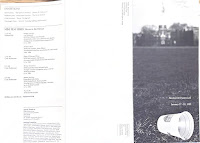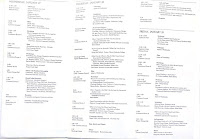Carpenter conceded that there was no "hard evidence" that Dartmouth is where he developed a drinking problem. However, after starting treatment for alcoholism in 1974, Carpenter noted an outsized incidence rate of other Dartmouth men and spouses seeking treatment as well. Going back to his Dartmouth experience, Carpenter remembered efforts taken by the administration to limit alcohol use, like a restriction on cup size and restrictions on the times alcohol could be served in fraternities. Still, Carpenter claimed "the strong impression on an immature underclassmen was that acceptance on campus depended upon the ability to imbibe ethyl alcohol. Even among the less impressionable it must have seemed that drinking was integral to the social process, more especially at Dartmouth than at similar colleges." From there, the message of the letter was clear: "...if anything was missing at Dartmouth it was hard facts about alcohol."
While hard facts about alcohol were missing from Carpenter's Dartmouth experience, there was no shortage of drinking mythology to guide students' attitudes. In the alumni magazine, Carpenter's letter appears under the title "Fill the Bowl Up?," a reference that would have been instantly understood as a nod to alumnus Richard Hovey's song Eleazar Wheelock:
In October 1976, the letter was reprinted in The Dartmouth under the name "No son-of-a-gun for beer," a nod to another quintessential Dartmouth drinking song:
A Son of a Gun
I wish I had a barrel of rum and
sugar, three hundred pound;
I'd put it in the College bell
and stir it 'round and 'round,
Let ev'ry honest fellow drink
his glass of hearty cheer,
For I'm a student of old
Dartmouth and a son of a gun for beer.
In the 1970s, these songs were popular and well-known. While historians agree that Wheelock arrived to Hanover with rum, there's no reason to believe he had 500 gallons. This type of embellishment reinforced Dartmouth's drinking mythology for nearly a century, and typified an environment where manliness was conflated with drinking.
After Norman Carpenter’s words were aired through The Alumni Magazine and The Dartmouth, a series of campus events highlighted discussions surrounding alcohol use and the role of fraternities on campus. The film Animal House, written by Dartmouth '63 Chris Miller, was released in 1978 and brought a national spotlight down on the fraternity system at Dartmouth. Only a week after Animal House aired on campus, Dartmouth faculty famously voted nearly unanimously to abolish Greek Life on campus. Spearheaded by English Professor James Epperson, charges were levied against the Greek system on the basis that fraternities perpetuated a culture of sexism, racism, homophobia, anti intellectualism, and alcohol abuse.
The Board of Trustees voted against abolishing the Greek system with the provision that fraternities clean up their act, and a slew of committees were established to study the role of Greek Life on campus. One such committee was the Alcohol Concerns Committee, chaired by Steve Nelson (director of Student Activities at Collis). In January 1982, the Alcohol Concerns Committee held a three-day alcohol awareness conference. As part of the coverage for the conference, The Dartmouth published a profile on Norman Carpenter, claiming that his letter was a "major impetus for the formation of the Alcohol Concerns Committee." One of the capstone events of this conference titled "Alcohol at Dartmouth" was a panel of Dartmouth alumni who were recovering alcoholics, including Norman Carpenter and Chair of the Dartmouth Board of Trustees Sandy McCullough.In Norman's original letter, he wrote that he had no intention to "embark on a messianic course to reform" Dartmouth. Instead, he opened his story to the community to ask if it's Dartmouth's responsibility to educate students about the dangers of alcohol abuse. Years later this aim was realized.
To read more about the Epperson proposal, request box 8181 from the Office of Residential Life records (DA-670). To read more about the history of alcohol use on campus, request Rauner Vertical Files "Drinking I" and "Drinking II" (DA-857).
Drinking Songs found on the Dartmouth Review Website "Lost Songs of Old Dartmouth" (https://dartreview.com/lost-songs-of-older-dartmouth/).
Posted for Spencer Mancuso '25, recipient of a Historical Accountability Student Research Fellowship for
the 2024 Winter term. The Historical Accountability Student Research
Program provides funding for Dartmouth students to conduct research with
primary sources on a topic related to issues of inclusivity and
diversity in Dartmouth's past. For more information, visit the
program's website.

